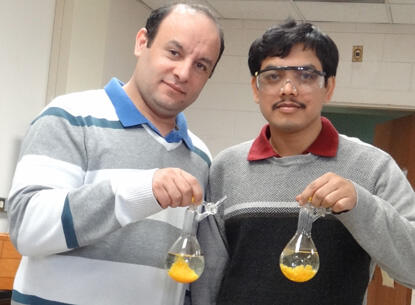
March 27, 2012
On Our Way to Clean Energy
VCU scientists develop materials to make transport, storage and use of natural gas more efficient
Share this story
Hashtags: #cleanenergy #fuelcell
Virginia Commonwealth University scientists have developed a “sponge-like” porous material – just one gram of this material is equal to the surface area of 11 tennis courts – to purify natural gas and store hydrogen gas to be used in clean energy applications such as fuel cells that generate electricity and water with zero emission.
On Monday, the VCU team presented the findings of their work at the 243rd National Meeting & Exposition of the American Chemical Society.
In many countries, generating natural gas without compromising environmental safety and the health of citizens has become a top priority. Carbon dioxide, CO2, is a major contaminant of hydrogen and natural gas fuels, and it is mainly released from coal-fired plants. Its separation and capture remain a great challenge.
So, the race is on to develop materials that can selectivity remove CO2 from hydrogen and methane fuels, or sequester it from flue gas – all of which would have a tangible impact on the environment and economy.
“The organic polymers we have created have the potential to remove impurities such as CO2 from natural gas making its transport, storage and use more efficient,” said lead author of the study, Hani M. El-Kaderi, assistant professor in the VCU Department of Chemistry.
“Moving into a ‘hydrogen economy’ would secure an energy source for the world and would eliminate greenhouse gas emission from the burning of fossil-based fuels, such as coal and gasoline, because the use of hydrogen in fuel cell produces only electricity and water,” he said.
El-Kaderi, together with Mohammad G. Rabbani, Ph.D., a research scientist in El-Kaderi’s lab who led the research efforts, developed a material that can soak up CO2 with high efficacy. They demonstrated that the new organic polymers, which have high thermal and chemical stability, can selectively capture carbon dioxide over methane, making them very practical for use in natural gas purification processes. El-Kaderi described the polymers as metal-free “green.” This means that the use of such polymers would eliminate the possibility of metal leakage during application or after disposal – making them environmentally friendly.
“Our team is expected to expand this materials domain in a timely fashion to explore new properties related to solar energy and catalysis, and I believe our findings will enable new technologies to emerge in the clean and renewable energy field,” he said.
While the technology is at the “discovery stage,” and it may take some time to develop large scale synthesis procedures for these polymers, there is a provisional patent on this technology through VCU, said El-Kaderi.
In related news, El-Kaderi was selected by the US Department of Energy as one of eight scientists from all national laboratories and university across the United States to present his research on hydrogen storage during the upcoming Department of Energy and Office of Basic Energy Science Hydrogen Storage Meeting in coordination with DOE Energy Efficiency and Renewable Energy’s Annual Merit Review scheduled for mid-May.
The study was supported in part by grants from VCU, the U.S. Department of Energy and Office of Basic Energy Sciences, and the American Chemical Society Petroleum Research Fund.
Subscribe to VCU News
Subscribe to VCU News at newsletter.vcu.edu and receive a selection of stories, videos, photos, news clips and event listings in your inbox.










